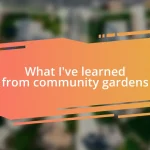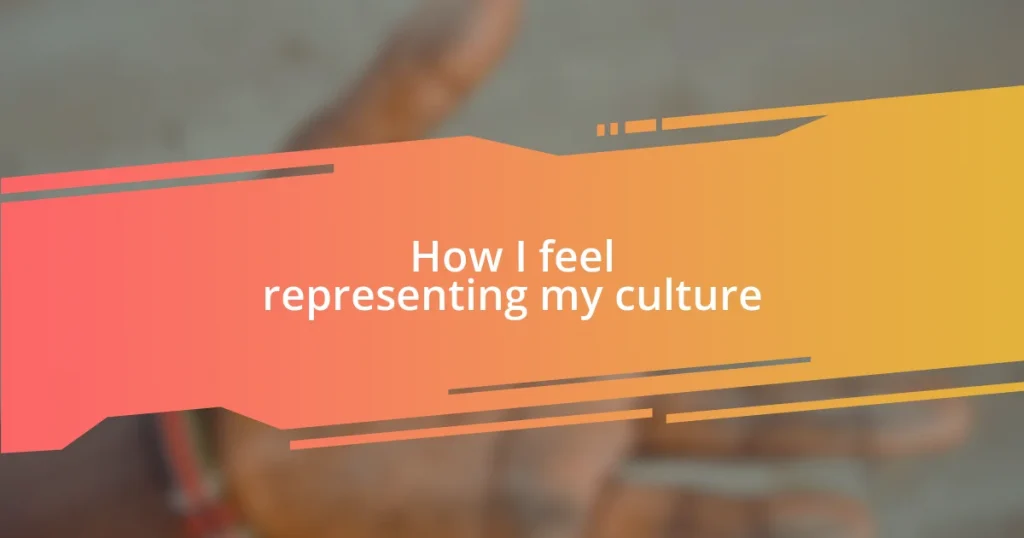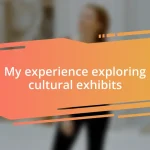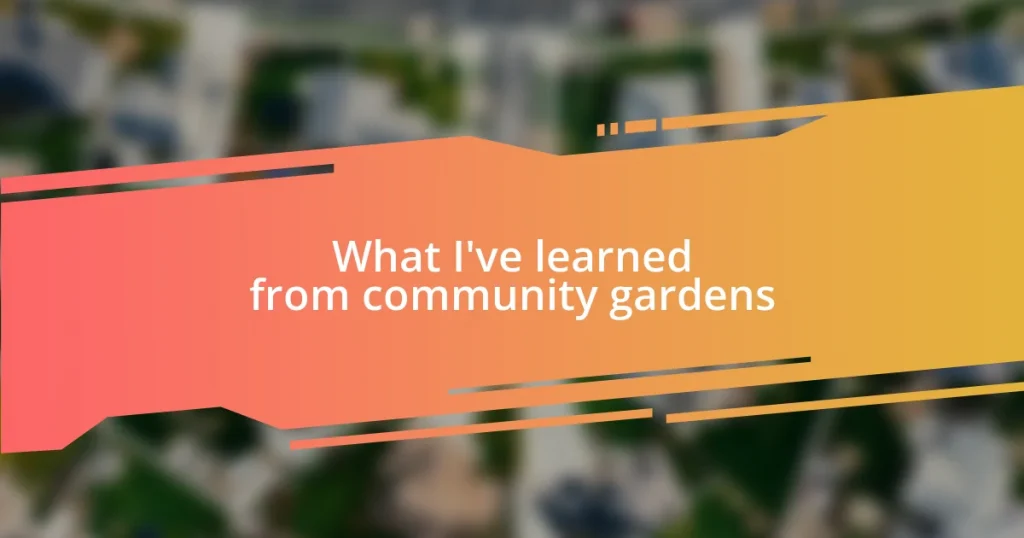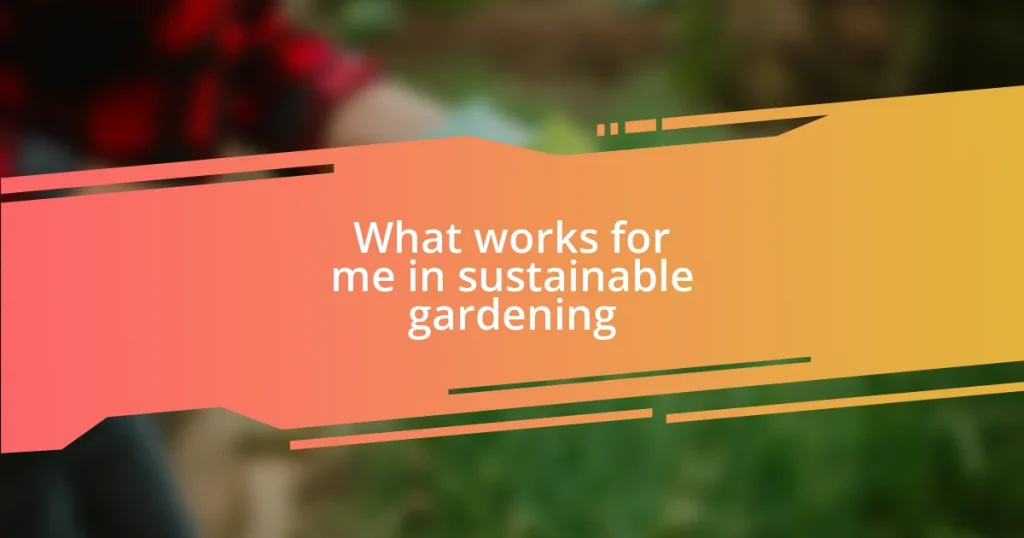Key takeaways:
- Cultural identity is dynamic, shaped by traditions, personal experiences, and modern influences that provide a sense of belonging and guide daily choices.
- Representation in media fosters pride, understanding, and belonging, while accurately reflecting cultural experiences helps combat stereotypes.
- Sharing cultural experiences through storytelling, community events, and social media inspires connection and creates a supportive community where diverse backgrounds are valued.
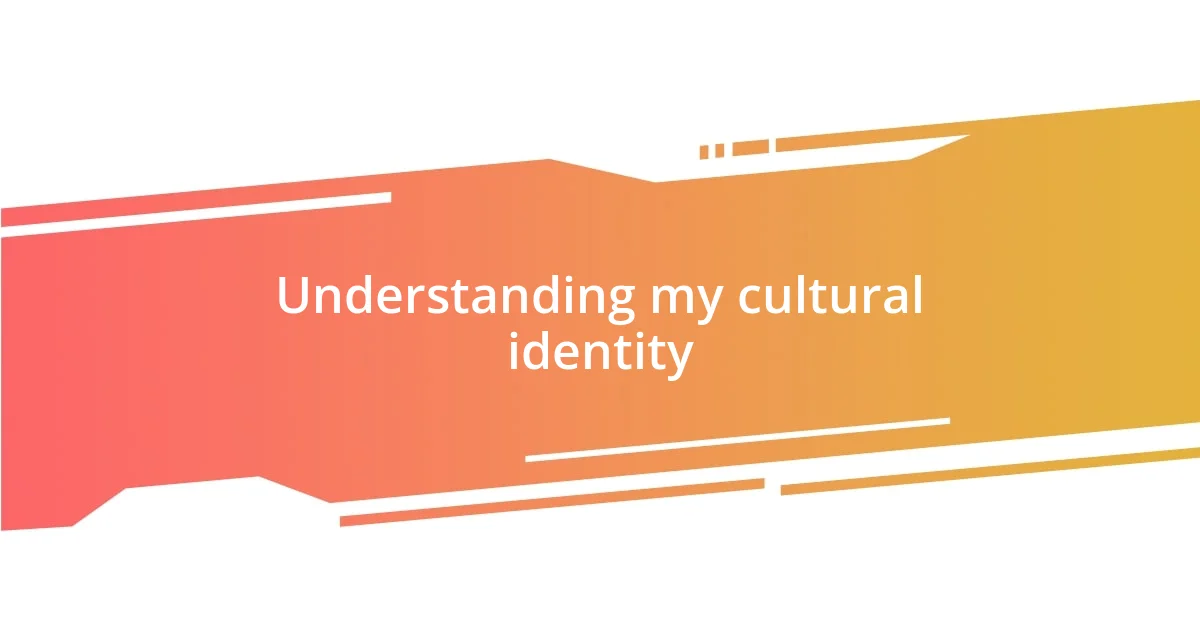
Understanding my cultural identity
Understanding my cultural identity has always felt like peeling back the layers of an onion. Each layer reveals something unique, from the vibrant traditions my grandparents cherished to the modern influences that shape my daily life. Have you ever paused to think about how your background shapes your worldview? It’s profound.
I remember a moment during a family gathering when my aunt shared stories from her childhood, tales steeped in our cultural values. Listening, I felt an overwhelming sense of belonging. It struck me how these narratives not only connect generations but also guide me in navigating my own identity. It’s as if those stories were threads weaving into the fabric of who I am.
Reflecting on my experiences, I realize that cultural identity is not static; it evolves with me. The foods I enjoy, the languages I speak, and the cultural practices I embrace shape my day-to-day living. When I think about it, isn’t it fascinating how our cultural identities can influence even the smallest choices, like what we choose to celebrate or how we find community? Embracing this dynamic identity contributes to my understanding of myself and my place in the world.
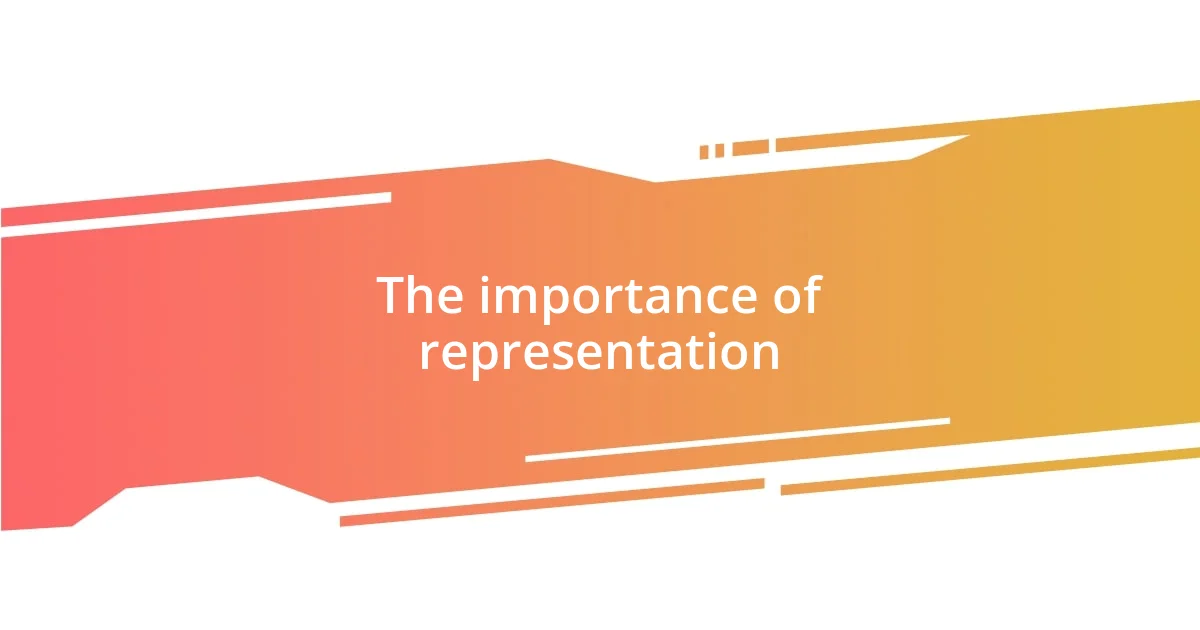
The importance of representation
Representation is not just a feel-good phrase; it holds significant weight in shaping our collective experience. When I see individuals from my culture depicted in various media, whether through literature, film, or art, it sparks joy and pride within me. I can’t help but remember watching a movie featuring actors who mirrored my own family in their stories—suddenly, I was no longer just an observer, but an integral part of the narrative. It reinforced the idea that our experiences matter and deserve to be shared.
- Representation promotes understanding among different cultures.
- It inspires individuals within a community to pursue their passions.
- Seeing relatable characters can help combat stereotypes and prejudices.
- It fosters a sense of belonging, showing people that their stories are valued.
- Representation helps future generations feel empowered in their identities.
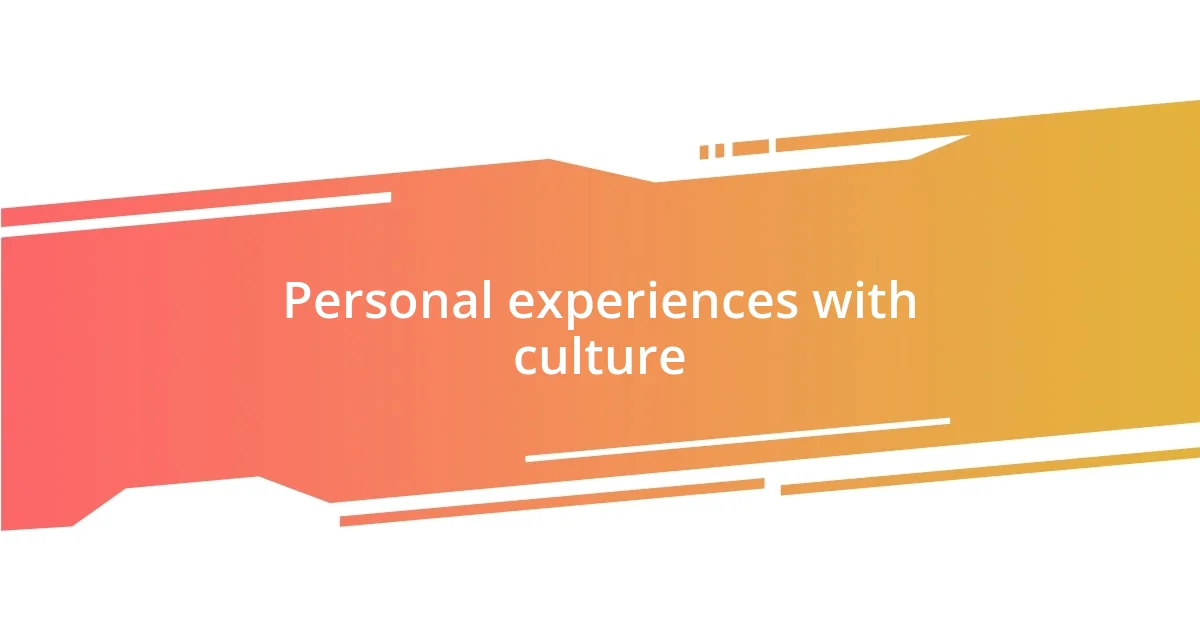
Personal experiences with culture
My immersion in cultural experiences has profoundly shaped how I see myself. I vividly recall celebrating a traditional festival with my family, where the air was filled with the aromas of familiar foods and the sounds of laughter around me. It was more than just a gathering; it was a moment of connection and joy that reinforced my roots and made me proud of my heritage. Has there been a similar experience in your culture that has driven home your identity?
Another poignant memory is my journey into learning my native language. Initially daunting, each new word felt like unlocking a door to untold stories from my ancestry. Engaging with fluent speakers always stirs a blend of pride and nostalgia, reminding me of the shared history and values that resonate through our conversations. It’s incredible how language can serve as a bridge to our past and a guide for our present.
Sometimes, I find myself reflecting on the customs I uphold regularly. For instance, I try to incorporate traditional clothing into my wardrobe on special occasions. Each time I wear it, I can feel a rush of pride; it’s as if I’m not just dressing up but wrapping myself in my culture’s history. Celebrating these small moments helps me remember that no matter where I go, the essence of my culture walks closely beside me.
| Experience | Emotional Insight |
|---|---|
| Traditional Festival Participation | Joy and Connection |
| Learning Native Language | Pride and Nostalgia |
| Wearing Traditional Clothing | Essence and History |
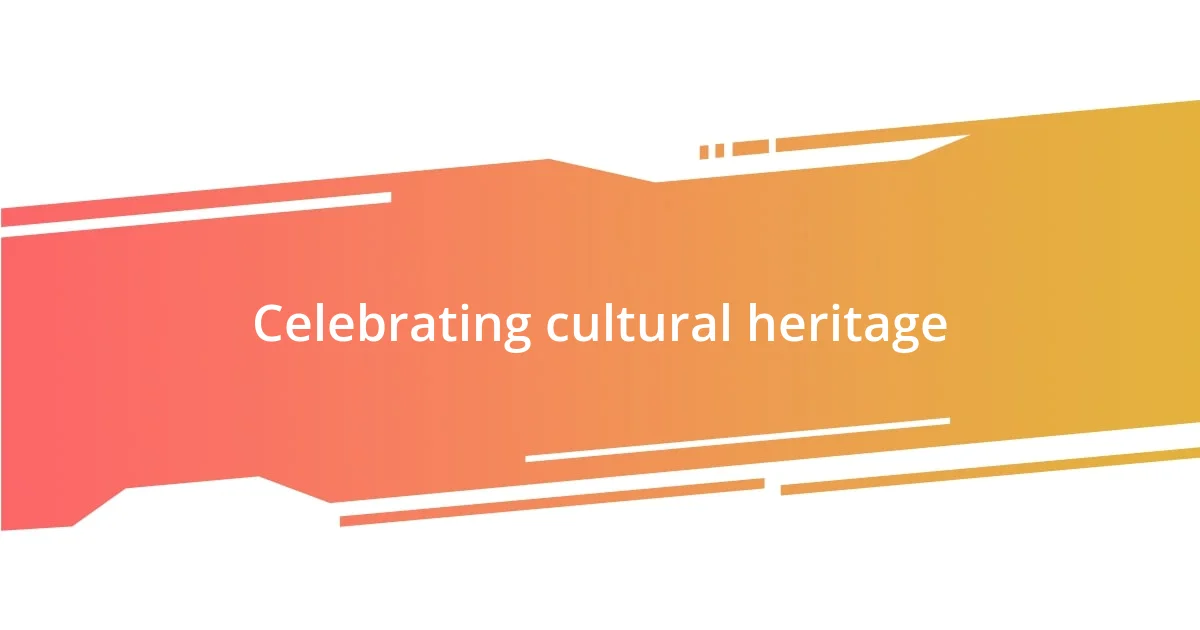
Celebrating cultural heritage
Celebrating cultural heritage fills me with gratitude and joy, especially when I’m surrounded by traditions passed down through generations. One of my fondest memories is attending a local craft fair where artisans showcased their skills. As I admired their work, I felt a profound connection to my roots. Watching skilled hands create intricate pieces reminded me of the stories my grandparents told me about their own crafting days. Isn’t it fascinating how tangible crafts can carry so much history?
Each year, my community gathers for a cultural parade celebrating our unique traditions. I can still picture the vibrant costumes and the rhythm of the drums echoing in the streets. Amidst the laughter and chatter, I often find myself lost in thought, reflecting on how these celebrations not only bring us together but also teach younger generations about their heritage. Have you ever had a moment where a celebration made you feel deeply connected to your culture?
Food offers another beautiful outlet for celebrating our heritage. I recall an afternoon in my kitchen with my mother, cooking a family recipe that dates back decades. The kitchen smelled of spices and the warmth of nostalgia enveloped us. As we layered flavors, I realized that sharing meals is a way of sharing stories and memories. It’s those moments that remind me how heritage isn’t just about the past; it’s a living connection that nourishes our identity today.
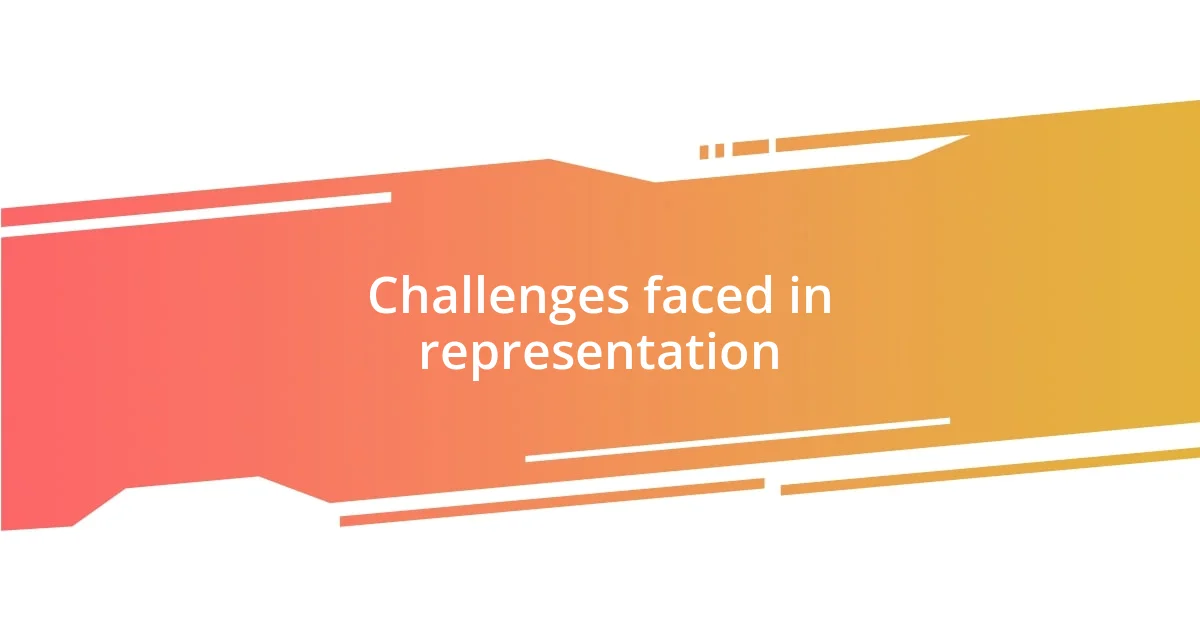
Challenges faced in representation
Representation of my culture often comes with its fair share of challenges. A notable struggle I encounter is the pressure to perfectly embody my heritage, which can feel overwhelming. I’ve found myself questioning if I’m doing justice to my cultural background, especially when faced with stereotypes that oversimplify complex traditions. Have you ever felt that burden of expectation when representing your own culture?
Another challenge lurks in the realm of misunderstanding and misrepresentation. I recall a time when I attempted to share an aspect of my culture with friends, only to have it reduced to a caricature that didn’t quite capture its essence. It was disheartening, and it made me acutely aware of how important accurate representation is. How can one truly appreciate a culture without experiencing its depth?
Moreover, navigating the balance between honoring my roots and adapting to contemporary society can be tricky. For instance, I often feel torn between embracing modern customs and preserving traditional practices, especially when they clash. It’s a dance of sorts—a constant negotiation of identity. Have you faced similar moments, where you wondered how to harmonize tradition with the present?
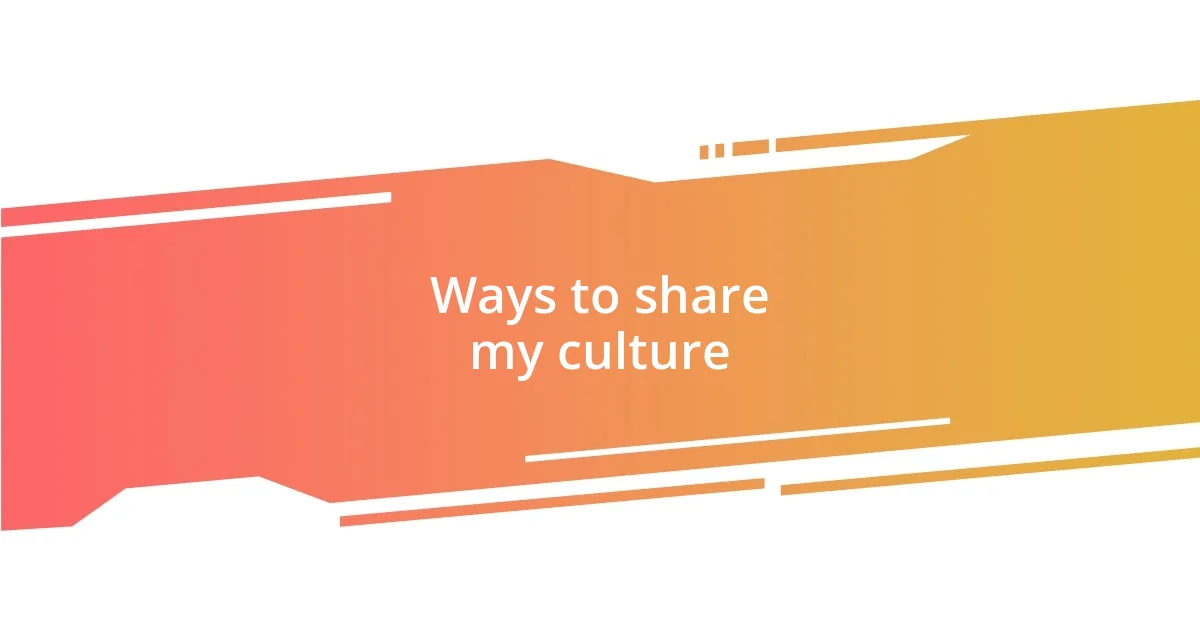
Ways to share my culture
Joining community events is one of my favorite ways to share my culture. I vividly remember attending a potluck where everyone brought a dish from their heritage. I felt a sense of pride as I presented my grandmother’s famous dish. Watching others savor it gave me a beautiful reminder of how food can speak volumes, transcending words to connect us all. Have you ever seen someone’s face light up while they tasted a meal from your culture?
In addition to events, storytelling plays a huge role in keeping my culture alive. I enjoy gathering with friends around a bonfire and sharing tales of my ancestors. Each story carries a lesson and a piece of history that breathes life into our traditions. It’s amazing how a story can transport us to another time and place, creating a shared understanding. Isn’t it incredible how narratives forge bonds between generations?
Lastly, I’ve found that engaging in social media has opened new doors for cultural sharing. Posting about traditions, experiences, and crafts not only allows me to connect with others but also fosters an appreciation for my culture online. I recall when I shared a short video of a traditional dance; the comments flooded in with curiosity and admiration. It’s a reminder that we can bridge cultural gaps and nurture curiosity through modern platforms. How do you use technology to represent and share your heritage?
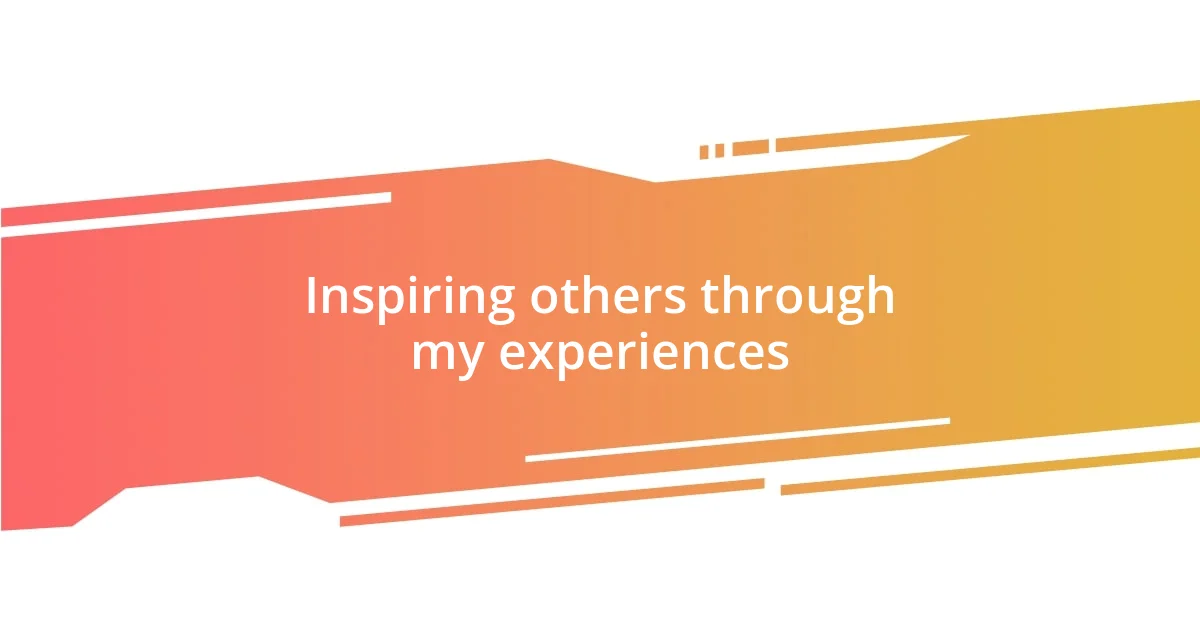
Inspiring others through my experiences
In my journey of representing my culture, I’ve often found that sharing my experiences can inspire those around me. One day, while volunteering at a local youth center, I shared the significance of a traditional celebration that many had never encountered. I was amazed to see the genuine interest it sparked among the teens, as they asked questions and sought to participate. It reminded me of the power of storytelling; when we open the door to our own experiences, we often invite others to step inside and connect with something beautifully unique.
Navigating the complexity of cultural representation has been both challenging and rewarding. I remember attending a workshop where I spoke about the nuances of my cultural practices. Afterward, a participant approached me, expressing that she felt seen and understood for the first time in her own cultural journey. It was a poignant moment, reinforcing my belief that when we share our truths, we create an environment where others can feel emboldened to do the same. Isn’t it fascinating how vulnerability can inspire strength in others?
Furthermore, the reactions I’ve received when sharing personal moments of my culture have often been heartwarming. Recently, I posted about a family ritual on social media, and the outpouring of comments from friends was overwhelming. Some shared their own similar traditions while others expressed a desire to learn more. This exchange solidified my understanding that inspiring others isn’t just about teaching; it’s about creating a community where experiences are valued, and connections are forged. How powerful is it when our stories resonate with others, fostering a sense of belonging and inspiration?
